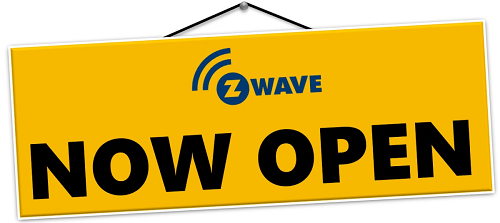
12.20.19 – CEPro –
Silicon Labs is putting forth a real effort to open up Z-Wave, with plans to create a multi-source wireless standard available to all.
Stakeholders have always touted Z-Wave as an “open standard,” but the popular home-automation protocol has been less than that since its inception nearly two decades ago. Even after the Z-Wave Alliance was formed in 2005, and multiple little steps were taken to “open” the protocol over the years, it still remained a less-than-open environment because only one company (first Zensys, then Sigma Designs, now Silicon Labs) made the silicon and owned the expertise for doing so. These Z-Wave “owners,” meanwhile, owned the standards-making process – implicitly or otherwise – so how “open” could it be?
Now Silicon Labs (NASDAQ: SLAB), which acquired the Z-Wave business from Sigma Designs in 2018, is making a real effort to open up the standard for real.
The chip-maker, along with the Z-Wave Alliance, have announced plans to “open the Z-Wave Specification as a ratified, multi-source wireless standard available to all silicon and stack vendors for development,” according to a statement released yesterday.
“With this change, semiconductor and software suppliers will be able to join the Z-Wave ecosystem, contribute to future advancements of the leading smart home standard, and develop and supply sub-GHz Z-Wave radio devices and software stacks.”
At the same time, it seems the Z-Wave Alliance will become a more independent standards-making and -certification body, overseeing (and encouraging) development by competitors of SiLabs.
While the move might invite new competition for SiLabs, it should expand the universe of Z-Wave providers and products, thereby driving consumer adoption of the Z-Wave ecosystem.
“As an early adopter of Z-Wave technology, we welcome this move by Silicon Labs,” said George Land, Z-Wave Alliance board member and general manager of digital products at Trane. “Enabling an even broader ecosystem of interoperability will bolster both consumer and manufacturer confidence, driving overall growth of the industry.”
Furthermore, the new openness might endear the tech giants that have avoided Z-Wave in part because it wasn’t “open enough” compared to other protocols like ZigBee. Indeed, Amazon, Apple and Google, along with the ZigBee Alliance, just announced plans to collaborate on a “Connected Home over IP” platform for interoperability. SiLabs, which makes ZigBee products in addition to Z-Wave, is part of the group.
PRESS RELEASE
Silicon Labs and Z-Wave Alliance Expand Smart Home Ecosystem by Opening Z-Wave to Silicon and Stack Suppliers
Z-Wave Alliance to Become Standards Development Organization for the Protocol
AUSTIN, Texas – Dec. 19, 2019 7:05 a.m. CST – Silicon Labs (NASDAQ: SLAB) and the Z-Wave Alliance announce plans to open the Z-Wave Specification as a ratified, multi-source wireless standard available to all silicon and stack vendors for development. With this change, semiconductor and software suppliers will be able to join the Z-Wave ecosystem, contribute to future advancements of the leading smart home standard, and develop and supply sub-GHz Z-Wave radio devices and software stacks. The Z-Wave Alliance will expand to a standards development organization for the Z-Wave Specification and will continue to manage the Z-Wave Certification program, which will include software and hardware.
Expected to be available in the second half of 2020, the opened Z-Wave Specification will include the ITU.G9959 PHY/MAC radio specification, the application layer, the network layer, and the host-device communication protocol. Instead of being a single-source specification, Z-Wave will become a multi-source, wireless smart home standard developed by collective working group members of the Z-Wave Alliance. With more than 100 million interoperable devices deployed, more than 3,200 certified products, and over 700 member companies, Z-Wave has the most mature and pervasive smart home ecosystem in the market.
Alliance members and smart home consumers will benefit from the hallmark features of Z-Wave, including interoperability, backwards compatibility, the S2 security framework, easy installation with SmartStart, low-power functionality with a 10-year battery life, and long-range with sub-GHz mesh. The Z-Wave Alliance will maintain the certification program and expand the offering to provide technology vendors with both hardware and stack certification and product manufacturers with application layer certification.
“As a standards organization, the Z-Wave Alliance will help solve the interoperability challenges hindering the adoption of smart home devices,” said Mitch Klein, executive director for the Z-Wave Alliance. “Members will work together on a single sub-GHZ connectivity solution that guarantees the forward-and-backward compatibility, interoperability, security, and robustness needed to grow the IoT. The Z-Wave Alliance will collectively advance a fully realized smart home standard.”
Silicon Labs is committed to IoT standardization. By expanding access to Z-Wave as a standard supported by multiple vendors, the smart home ecosystem will benefit both from broader technology support as well as accelerated market adoption.
“Silicon Labs has worked to create positive alignment across the industry with the goal of advancing both security and compatibility in smart home devices,” said Jake Alamat, vice president and general manager of IoT home and consumer products at Silicon Labs. “Future success for the smart home industry relies on ecosystems getting closer, not farther apart. The smart home market opportunity is tremendous, and we want to help drive its success. When the ecosystems work together toward a common goal, the entire industry including manufacturers, developers, retailers, and consumers benefit from this open collaboration.”
“As an early adopter of Z-Wave technology, we welcome this move by Silicon Labs,” said George Land, Z-Wave Alliance board member and general manager of digital products at Trane. “Enabling an even broader ecosystem of interoperability will bolster both consumer and manufacturer confidence, driving overall growth of the industry.”
Silicon Labs will continue to invest in Z-Wave technology and contribute to its future growth, collaborating with new suppliers through the expanded Z-Wave Alliance. Development on the opened Z-Wave Specification will be managed by the new working groups in the Alliance from Q3 2020, and details on the silicon and stack platform certification program will be announced.
